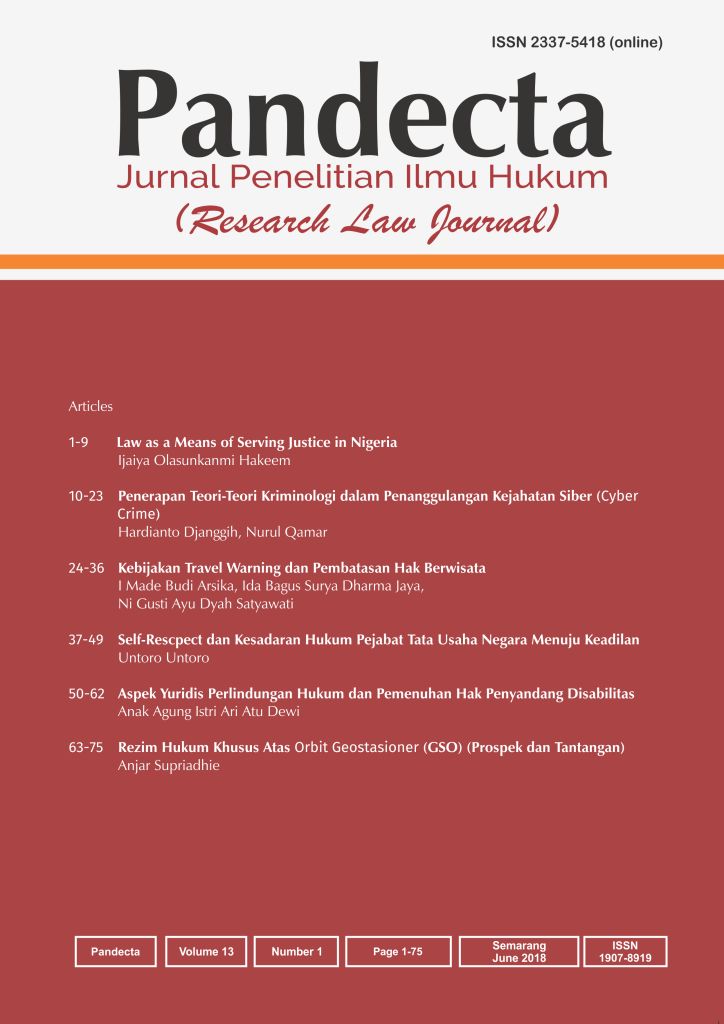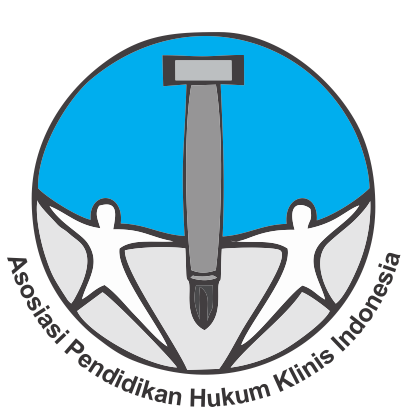Ideologi Etis Penyingkap Korupsi Birokrasi
(1) Wijayakusuma University
Abstract
Birokrasi dan korupsi ibarat dua sisi mata uang. Dimana ada birokrasi disitu ada korupsi. Menyingkap korupsi di lingkungan birokrasi bukanlah perkara mudah, hal itu butuh “orang dalam” untuk menyingkap korupsi tersebut, mereka adalah aparatur sipil negara. Oleh sebab itu, tindakan whistleblowing sangat dibutuhkan untuk menyingkap kasus korupsi birokrasi. Keputusan seorang aparatur sipil Negara untuk menyingkap korupsi adalah keputusan yang didasarkan ideologi etis. Keputusan ideologi etis menjadi modal utama bagi seorang penyingkap korupsi (whistleblower). Penelitian bertujuan untuk mengungkap alasan para aparatur sipil Negara tersebut dalam menyingkap korupsi yang terjadi di lingkungan kerja mereka, serta mendeskripsikan tindakan mereka dalam menyingkap korupsi birokkrasi. Penelitian dilakukan dengan pendekatan socio legal research, informan penelitian ini adalah para aparatur sipil negara yang menyingkap korupsi birokrasi di Jawa Tengah. Hasil Penelitian ini menunjukkan bahwa alasan pribadi dan lingkungan merupakan alasan para aparatur sipil negara dalam menyingkap korupsi. Ideologi etis sangat berperan dalam mengungkap terjadinya penyimpangan di tempat kerja, termasuk korupsi birokrasi. Idealisme menjadi pertimbangan etis bagi para penyinngkap korupsi birokrasi. Tipologi ideologi etis yang dimiliki para penyingkap korupsi birokrasi ini adalah Idealisme Absolutists. Idealism absolutis yang dimiliki para whistleblower menjadikan mereka sebagai pihak yang dimusuhi dan disingkirkan di lingkungan birokrasi. Sangat disayangkan, tindakan mereka menyingkap korupsi birokrasi belum mendapat perlindungan hukum.
Bureaucracy and corruption are like two sides of a coin. Where no bureaucracy there is no corruption. Exposing corruption within the bureaucracy is not easy. Need an “insider” to expose corruption, they are civilian state apparatus. Whistleblowing action is needed to expose the corruption of the bureaucracy. The decision of a civilian state apparatus to expose the corruption is unethical decision based ideology. Decision ethical ideology is the main basis for a personally-corruption (whistleblowers). The research aims to uncover the reasons the civilian apparatus of the State in exposing corruption in their working environment, and to describe their actions in exposing corruption birokkrasi. The study was conducted with the approach of socio legal research, informants of this study is the civilian state apparatus that exposed the corruption of the bureaucracy in Central Java. Research shows that personal and environmental reasons is the reason the civilian apparatus of the state in exposing corruption. Ethical ideology was instrumental in uncovering of irregularities in the workplace, including bureaucratic corruption. Idealism becomes penyinngkap ethical considerations for bureaucratic corruption. Typology ethical ideology personally owned the bureaucratic corruption are Absolutists Idealism. Absolutist idealism owned by the whistleblower make them as those who despised and excluded within the bureaucracy. Regrettably, their actions expose the corrupt bureaucracy has legal protection.
Keywords
Full Text:
PDFReferences
Andvig, J.C.; Fjeldstad, O-H.; Amundsen I.; Sissener, T.; Soreide T. 2000. Research on Corruption. Chr. Michelsen Institute & Norweigan Institute of International Affairs.
Ajzek, Icek, 1991, The Theory of Planned Behavior, Organizational Behavior And Human Decision Processes, Department of Psychology, University of Massachusetts
Awaludin, Arif, 2011, Rekonstruksi Perlindungan Hukum Terhadap Penyingkap Korupsi (Studi Kasus Budaya Hukum Aparatur Sipil Negara Dalam Menyingkap Korupsi Birokrasi Di Jawa Tengah), Disertasi, Semarang: PDIH UNDIP
Brink, Alisa G. et.all, 2015, The Effects of Personality Traits, Ethical Position, and the Materiality of Fraudulent Reporting on Entry-level Employee Whistleblowing Decisions, Journal of Forensic & Investigative Accounting Vol. 7, Issue 1.
Caiden, Gerald E. 1980, The Conference on Fraud, Waste and Abuse in Government, University of Pittsburgh, 5-7 October 5-7 1980.
Caswell, S. V. 2003. Individual Moral Philosophies And Ethical Decision–Making Of Undergraduate Athletic Training Education Students And Instructors. (Unpublished doctoral dissertation). Ohio University, USA
Chan, C. L. M., Othman, J., & Jones, R. 2011. The Conceptual Model of Personal Moral Philosophy (PMP) and Ethical Decision Making (EDM). Journal of Management Research, 3(2). http://dx.doi.org/10.5296/jmr.v3i2.752
Dempster, Quentin, 2006, Whistleblowers Para Pengungkap Fakta, Jakarta : Elsam- Lembaga Studi dan Advokasi Masyarakat
Forsyth, D. R. (1980). A Taxonomy Of Ethical Ideologies. Journal of Personality and Social psychology, 39(1).
Forsyth, D. R., O’Boyle Jr, E. H., & McDaniel, M. A. 2008. East Meets West: A Meta-Analytic Investigation Of Cultural Variations In Idealism And Relativism. Journal of Business Ethics, 83(4), 813
Gordon Graham, 2010, Theories of Ethics: An Introduction to Moral Philosophy, Routledge.
Henle, Christine A., Robert A. Giacalone dan Carole L. Jurkiewicz,2005, The Role of Ethical Ideology in Workplace Deviance, Journal of Business Ethics 56: 219–230, Springer.
Knabe, Ann Peru, 2012, Applying Ajzen's Theory of Planned Behavior to a Study of Online Course Adoption in Public Relations Education, Dissertation, Marquette University, Milwaukee, Wisconsin
Lin, C.-P., & Ding, C. G. 2003. Ethical Ideology, Subjective Norm, and Peer Reporting Intentions using An Individual-Situation Moderator. Asia Pacific Management Review, 8(3), 311
Mertins, Herman Eds. 1999, Applying Professional Standards and Ethics in the 21st Century, American Society for Public Administration
Muhaimin, Yahya, 1990, Bisnis dan Politik “Kebijaksanaan
Ekonomi Indonesia 1950 - 1980”, LP3ES: Jakarta
Nas, Tevfik F., Albert C Price, and Charles T Weber, “A Policy-Oriented Theory of Corruption”, (The American Political Science Review, Vol 80, No. 1., 1986), Hlm.109
Pekdemir, Isıl Mendes dan Aygül Turan, 2015, The Influence of Ethical Ideologies on Promotive Extra Role Behaviors and Positive Work Behavior of Individuals. International Journal of Business and Social Research Volume 05, Issue 08.
Pope, Jeremy, 2003 Strategi Memberantas Korupsi, Edisi Ringkas, Diringkas oleh Tjahjono EP, Jakarta: Tranparansi Internasional
Rahardjo, Satjipto, 2005, Mengadili Korupsi Mengapa Dipersulit, Jakarta: Penerbit Buku Kompas
Rehg, M.T., Miceli, M.P., Near, J.P. and Van Scotter, J.R., 2008, “Antecedents and outcomes of retaliation against whistleblowers: gender differences and power relations”, Organization Science, Vol. 19 No. 2,
Sanit, Arbi, 2006, dalam Tim Simpul Demokrasi. Reformasi Birokrasi dan Demokratisasi Kebijakan Publik. Malang: Averroes Press.
Schlenker, B. R., 2008. Integrity And Character: Implications Of Principled And Expedient Ethical Ideologies. Journal of Social and Clinical Psychology, 27(10).
Sudimin, Theo, 2003, Whistleblowing; Dilema Loyalitas dan Tanggung Jawab Publik, Jurnal Manajemen dan Usahawan, Vol 32-11.
Supeno, Hadi, 2010, Korupsi di Daerah: Kesaksian, Pengalaman, dan Pengakuan, Yogyakarta: Total Media
Perundang-undangan
UU Nomor 43 Tahun 1999 jo UU no 8 Tahun 1974 tentang Pokok-Pokok Kepegawaian.
UU No. 28 Tahun 1999 tentang Penyelenggaraan Negara yang Bersih dan Bebas dari Korupsi, Kolusi, dan Nepotisme
UU No. 31 Tahun 1999 tentang Pemberantasan Tindak Pidana Korupsi diubah menjadi
UU No. 13 Tahun 2006 tentang Perlindungan Saksi dan Korban yang diubah menjadi UU No.31 Tahun 2014
UU Nomor 5 Tahun 2014 tentang Aparatur Sipil Negara.
Peraturan Pemerintah No. 57 Tahun 2003 tentang Tata Cara Perlindungan Khusus
Peraturan Pemerintah Republik Indonesia Nomor 42 Tahun 2004 Tentang Pembinaan Jiwa Korps Dan Kode Etik Pegawai Negeri Sipil.
Peraturan Pemerintah Nomor 53 Tahun 2010 tentang Dispilin PNS
Peraturan Pemerintah Nomor 46 Tahun 2011 tentang Penilaian Prestasi kerja PNS
Internet
Asshiddiqie, Jimly, 2013, Perkembangan Sistem Norma Menuju Terbentuknya Sistem Peradilan Etika www.jimly.com/makalah/namafile /178/ Jurnal_ MIPI_ tentang_Etika.pdf Di Unduh terakhir pada 31 Agustus 2016
http://www.acfe.com Diunduh terakhir pada 31 Agustus 2016
Refbacks
- There are currently no refbacks.


